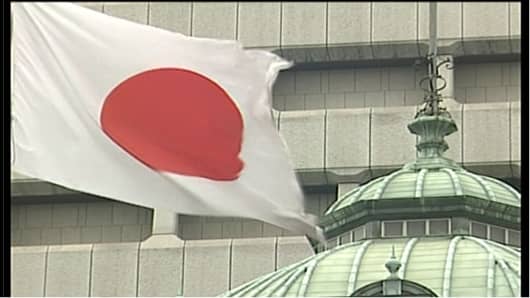Bank of Japan Governor Masaaki Shirakawa said on Friday the central bank was putting equal focus on inflation and downside risks to the economy, reinforcing the view that interest rates will stay on hold at least for the rest of this year.
Fears that the Japanese economy, in the midst of its longest postwar expansion, may be slipping into a recession are being fuelled by growing concerns over the health of the U.S. economy, which is reeling from a credit crisis and housing slump.
Shirakawa told a seminar that tightening monetary policy in response to soaring energy and raw material prices would be inappropriate as that could seriously hurt economic growth.
The central bank might need to act if rising raw material costs have a knock-on effect on overall prices and boost wages, but there are few signs of that happening for now, he said, reiterating the BOJ's neutral stance on monetary policy.
"We are in a phase where we need to pay attention to both the economy and prices, Shirakawa said. "There's no difference in weighting on those risks. In that sense, it is 50-50."
Financial markets did not react much to his comments, as they did little to alter the prevalent market view that the central bank will keep rates on hold at 0.5 percent this year or even longer on lingering economic uncertainties at home and abroad.
"Shirakawa is placing more stress on downside risks to the economy than rising inflation," said Seiji Shirakawa, chief economist at HSBC Securities Japan. "He sees the current price hikes as having a negative impact on the economy while he's paying more attention to downside risks from the U.S. economy."
The BOJ kept interest rates unchanged in a widely expected move on Tuesday but cut its economic growth forecast for the fiscal year to next March to 1.2 percent, the slowest pace in six years, from 1.5 percent projected in April.
Reflecting soaring oil prices, the central bank raised its core consumer inflation forecast for this fiscal year to 1.8 percent from a 1.1 percent rise forecast in April. That would be the fastest inflation in a decade, underlining the central bank's policy dilemma as it juggles the risks of slowing growth and rising global inflationary pressure.
While it faces a tough balancing act, the BOJ's task is less complicated than that of the European Central Bank or the U.S. Federal Reserve because soaring commodity prices are not feeding through into wages and other costs in Japan.
Rather, commodity costs act like a tax on Japan's economy, dampening consumption as it recovers from a decade of deflation and slashing the contribution of net exports to gross domestic product at a time when demand is sputtering in European and U.S. markets.
In the BOJ's policy meeting in June, some BOJ board members said more emphasis should be placed on downside risks to the Japanese economy than upside risks to prices, as wage growth remains sluggish, minutes of the meeting showed on Friday.


